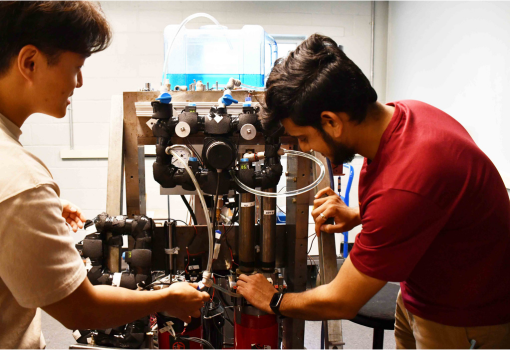
|
 |
Research Assistant Het Mevada (right) is part of a CEEE research team developing eco-friendly elastocaloric cooling systems. |
|
Give Het Mevada three minutes, and he’ll succinctly explain how today’s HVAC systems contribute to global warming and how his research at the University of Maryland’s Center for Environmental Energy Engineering (CEEE) is leading to the development of a new generation of air conditioners that could have zero global warming impact.
Mevada, a mechanical engineering doctoral student at the A. James Clark School of Engineering, was selected as a finalist in the university’s Three Minute Thesis (3MT) competition, which challenges graduate students to communicate the significance of their research projects to a non-specialist audience in just three minutes. Clark School judges were wowed by Mevada’s delivery in the schoolwide preliminary competition in March and advanced him to the university-wide April 17 finals, where he will compete against students from all disciplines. He is one of nine finalists in the Master’s & Pre-Candidacy category.
Guidance from CEEE Director and Minta Martin Professor Dr. Reinhard Radermacher set Mevada on the path to presentation success. Radermacher advises all new doctoral students to prepare a one-minute elevator pitch about their research. “We use those elevator speeches to explain our projects every time sponsors visit our lab. I used that speech to frame my 3MT presentation,” says Mevada, whose research focuses on elastocaloric cooling systems that use metals as refrigerants — allowing for high-performance cooling with no direct environmental impact.
While Mevada’s elevator speech is geared toward individuals with a technical background, the 3MT presentations are aimed at nonspecialists, forcing the graduate research assistant to grapple with how to make a complex subject understandable and relevant to the public. Fortunately, as a fellow in the Clark School’s Future Faculty Program, Mevada has been studying how to give effective presentations.
“The Future Faculty Program teaches us how to communicate about our research to anyone, even if they’re not from STEM,” says Mevada, who aspires to become an engineering professor. He’s certain that his participation in the 3MT competition will help prepare him for the challenges ahead. “Whether I’m meeting someone at a conference, talking with a sponsor, or teaching a class,” says Mevada, “the takeaway from this experience is the importance of communicating confidently to an audience.”
Watch a recording of Het Mevada's presentation in the 3MT finals.
Related Articles:
CEEE Research Professor Yunho Hwang to Receive Provost’s Excellence Award
UMD Researchers Develop New Performance Metric to Optimize Elastocaloric Cooling Systems
Join Us for a Tour of UMD's Energy Engineering Labs
How Much Wood Could a Heat Pump Dry?
Jump Start Program Gives CEEE Grad Students a Boost
DOE Ups Its Investment in UMD to Develop Eco-Friendly Heat Pumps
Elastocaloric Cooling Named One of the Top 10 Emerging Technologies to Address Global Challenges
CEEE Co-Director Leads Global Webinar on Advances in Low-GWP Heat Pumps
UMD receives two new DOE Building Technologies awards
April 12, 2024
|

